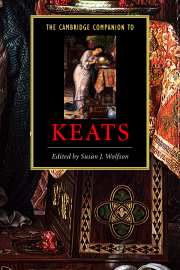Book contents
- Frontmatter
- 1 The politics of Keats’s early poetry
- 2 Endymion’s beautiful dreamers
- 3 Keats and the “Cockney School”
- 4 Lamia, Isabella, and The Eve of St. Agnes
- 5 Hyperion, The Fall of Hyperion, and Keats’s epic ambitions
- 6 Keats and the ode
- 7 Late lyrics
- 8 Keats’s letters
- 9 Keats and language
- 10 Keats’s sources, Keats’s allusions
- 11 Keats and “ekphrasis”
- 12 Keats and English poetry
- 13 Byron reads Keats
- 14 Keats and the complexities of gender
- 15 Keats and Romantic science
- 16 The “story” of Keats
- 17 Bibliography and further reading
- Index
15 - Keats and Romantic science
Published online by Cambridge University Press: 28 May 2006
- Frontmatter
- 1 The politics of Keats’s early poetry
- 2 Endymion’s beautiful dreamers
- 3 Keats and the “Cockney School”
- 4 Lamia, Isabella, and The Eve of St. Agnes
- 5 Hyperion, The Fall of Hyperion, and Keats’s epic ambitions
- 6 Keats and the ode
- 7 Late lyrics
- 8 Keats’s letters
- 9 Keats and language
- 10 Keats’s sources, Keats’s allusions
- 11 Keats and “ekphrasis”
- 12 Keats and English poetry
- 13 Byron reads Keats
- 14 Keats and the complexities of gender
- 15 Keats and Romantic science
- 16 The “story” of Keats
- 17 Bibliography and further reading
- Index
Summary
It is richly ironic that Keats's medical training, once cited as a sign of his low cultural standing, has been credited in recent scholarship for the precision and intellectual sophistication of Keats's response to the momentous scientific and medical developments of his era. “So back to the shop Mr John,” Blackwood's ”Z.” sarcastically concluded a notorious attack on Keats as a “Cockney” poet, mocking him as an “uneducated and flimsy stripling” in the grip of “mania” and “malady,” who would do better as a “starving apothecary than a starved poet.” “Z.” knew that Keats had been an apprentice to an apothecary-surgeon - the standard way for those without university educations to enter medical practice - and his review evoked the dated stereotype of the quackish, low-status apothecary, dispensing “plasters, pills, and ointment boxes” (524) with knowledge gained mainly from haphazard, hands-on experience. What “Z.” ignored (and recent scholarship has painstakingly established) is that Keats became a licensed apothecary at a time when medical education was undergoing significant reform, completing his training at Guy's, one of the most advanced teaching hospitals. Having earned a reputation at Enfield Academy for a brilliant, probing, and retentive mind, Keats found himself at Guy's, an institution that was helping to reshape the profession of medicine with the latest currents in scientific thought. How did this experience mark Keats's thinking and writing?
- Type
- Chapter
- Information
- The Cambridge Companion to Keats , pp. 230 - 245Publisher: Cambridge University PressPrint publication year: 2001
- 4
- Cited by

